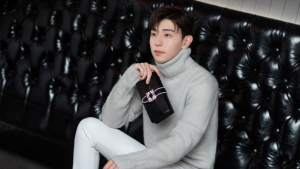- Movie adaptation of popular memoir about teaching in China could include an added love interest, focus on performance of plays in classroom setting
- Author confident that director Lu Chuan understands his take on small-town transition
- Chinese readers have expressed an intense connection with the late 1990s period of the book

Peter Hessler, author of River Town: Two Years on the Yangtze (MacArthur Foundation, Creative Commons)
Not since Iron and Silk premiered at the Sundance Film Festival in 1991 has a movie based on a memoir about teachers on the front lines of U.S.-China relations come to the big screen. Director Shirley Sun’s mostly-English-language film adaptation of Mark Salzman’s 1986 book—in which the author played himself—grossed just over $350,000 and was never released in China. It was a film ahead of its time.
What was then a trickle of mutual interest between China and the U.S. is now a matter of daily fascination. Like Salzman, longtime New Yorker writer Peter Hessler captured his time trying to shape young minds at a teacher’s college in China’s interior. River Town: Two Years on the Yangtze, set during the years 1996-98, has captured the imagination of hundreds of thousands of readers in both countries. In the years since the book was written, the Chinese movie market has gone from being an experiment to landing on the cusp of becoming the world’s largest. China Film Insider Editor Jonathan Landreth spoke with Hessler after hearing the news that a movie version of River Town is in the works, to be helmed by Lu Chuan, the Chinese director of the award-winning films Kekexili: Mountain Patrol and City of Life and Death.
How did the idea of a River Town movie come about?
This started with a friend of mine named Jamie Gordon—she’s the producer. We were college friends and stayed in touch ever since. She kind of followed what I was doing in China. I remember coming back from my first trip to China and stopping in L.A. and seeing her. I think she had just worked on Forrest Gump at that point. She’s been in the industry for a while, and she’s always had this desire to make something out of River Town. I gave her an option on it two or three years ago and she realized there was interest in China and she started exploring in that direction. And so that’s really what the connection is, that’s how it started.
Was your book about life in Fuling written as journalism?
It was a memoir because I wasn’t a journalist—I was teacher.
You struggled with what you taught your students and how they taught you. How’s that conflict going to play out in today’s moviemaking climate in China in which foreign influence is frowned upon and censors have the final say?
I’m not in charge of writing the screenplay, but they’ve assured me. I trust Jamie and I’ve told her that I care about the political content, but at the same time it’s an adaptation, it’s not a documentary. There’s probably going to be a love interest added, they same way one was added to Iron and Silk. I talked to Lu Chuan and know he feels a connection to that period because he was a college student at that time, studying English. This is one of the reasons that there’s interest in it in China: there are people who feel a certain sentimentality about that time. Lu liked the book because it brought back memories of that time, and what it was like. That interests me. I think that period means something different to Chinese.
Was selling the option lucrative relative to a book contract?
No. There hasn’t been a lot of money that’s changed hands in my direction [laughs], but that’s not really the interest. Jamie has been passionate about doing this and she’s worked on a lot of great projects in the past, so I have faith in what she does. I was interested to see what they can do with it. It hasn’t reached a point where there’s been much talk of money.
Has producer Jamie Gordon worked on a China projects before?
I don’t think we’ve ever had a serious look at it from the American side. There’ve been a couple of Chinese who have approached me about it over the years, but I didn’t really know anything about them.
Where is the funding coming from? A Chinese producer?
Yeah, at this point the funding is coming from a Chinese investor, this early stage where they’re funding the script. I talked with him on Skype the other day. He’s the guy who’s from Henan and worked in Shenzhen around the time I was writing about. And now he’s based in the U.S., I think he’s actually based in Memphis.
Think back to your first encounter with Chinese movies, or images of China on the screen. Do you recall what film first grabbed your eye?
The first one would be The Last Emperor, right? I saw that as a child. I didn’t grow up with an interest in China, but I remember my father taking me to that. I was probably fairly small and it left a deep impression. The span of time—even though I knew nothing about China and Communism and all these things—really captured this sense of change. I like that there is something about Chinese films sometimes, or maybe it’s films about China, that do that. I felt like Huozhe [活着 To Live], the Zhang Yimou movie, which was probably my favorite of his films, had a similar feel—this kind of sweep of history, but at the same time, the history’s very personal and individual, focusing on a person. Maybe it has something to do with the depth of the past and the country. Somehow this translates well on screen.
My path was different, via an obsession with Hong Kong gangster films.
I never was into that. I grew up in Missouri and you wouldn’t get stuff like that there. It was pretty straightforward. I worked in a movie theater all through high school and a little bit in college. I was the guy who’d sell popcorn. It was mostly Top Gun, one summer it was endless Top Gun. [laughs]
Would you call yourself a real movie fan?
No. I mean I enjoy movies, but I don’t look at them the way I look at books. If I watch a movie, I don’t watch it with a technical eye. I’m not very observant, not aware of what the filmmaker’s doing—I just enjoy it for what it is. Whereas as a reader, I read as a writer and I think about what people are doing and what they’re doing right and what they’re doing wrong. And I sort of enjoy film because I don’t have that. I’ve never had any interest in being involved in film at all. There was a story I did for The New Yorker called “Dr. Don” a few years ago about a pharmacist in a small town in Colorado that was optioned and they’ve made a pilot from it, which they’re now shopping around. It had Chloe Sevigny in it and John Hawkes and so on. And I said great, good luck, basically.
Does that mean that you’ll have no hand in the script?
It’s a little different here because I’m close to Jamie. I won’t be writing the script but I’ll definitely give feedback. We’ve sat down and talked. They’re interested in some of the theatricality of the teaching and the way the students said what I described them saying in performing plays in class. I think this is a promising possible structure. Lu Chuan was interested in that as well. You know, the classroom scenes in that area when I was teaching were kind of intense when I look back on them. All the kids are wearing kind of the same clothes, they were all cold, a lot of them were hungry. This was a very different era in China. There was intensity in their appreciation for what they were doing. Being a college student then was very different from what it is now in China. I sat down with them, I talked to them a lot. One of the things they talked to me about when they first started to do this was, “How would it be if we made it contemporary?” And I said, “Well, no, that wouldn’t work at all.” The appeal of that book is that moment, and I think that that moment says something important about China. And so I told them that’s really something that has to be part of it, and we talked about that and they understood exactly. And, of course, Lu Chuan totally understood that as well.
What’s so important about that moment you described?
It was a real transition moment. This is one of the reasons I think the book became popular in China, because by the time it came out there [in 2012] it was pretty old. The book still gets read in America, but people had this intensity of connection to it in China that surprised me. Over and over they would say, “You know, I’d forgotten what that was like; all the details about what we didn’t have. What you wrote about really brings it back for me.” Especially the kids I’ve taught—it was a big transition for them. These were people from the countryside. They were people from families that had basically no history of serious education. But they are now urban people. They’re now middle class. They’re city dwellers. They’re educated. Most of the people who I got to know in the town were also making that transition. Fuling itself was a city that was incredibly remote at that time. That sort of remoteness is hard to visualize now, because they have a high-speed rail and a couple of highways going into town. Things are really different. There was something sort of amazing about that moment. And I knew it at the time, that was really why I sat down and wrote the book. I wrote River Town without any contact with the publishing world initially, I didn’t even bother to get an agent because I hadn’t published much, and I had a former teacher who encouraged me to think about doing this. When I thought about it I just said, this experience means a lot to me and I sort of want to try to capture this, and if nothing else, later in my life when I hopefully become a writer I’ll have this material and I’ll be able to draw from it in some way. But that desire to record the moment was very powerful.
Which teacher are you referring to?
The teacher is John McPhee. He wrote me a letter. When we were in Fuling we were very isolated. My sister had a baby and I didn’t find out for a couple of weeks. The mail would be so slow. I remember Lady Diana died and we didn’t find out for days. It’s really hard to imagine now, we didn’t have email, and in some ways that was a wonderful thing. That’s one of the main reasons why my notebooks are so full, because I had a lot of time on my hands and I was really just writing and processing stuff, and I wasn’t corresponding with people in America that much. I was writing letters to people, mailing them off, but mostly I was recording what was going on. And then we got email with about six months to go. I had been writing with John McPhee through the years I was there, and when I got email, we started corresponding, and at one point I said, you know, I’m thinking about my career stuff, and I’m looking into journalism jobs, and I’m thinking about what I should do afterwards, and he wrote back a very long email, saying literally something like, “Fuling is a book.” And that was in December my last year, so I was going to finish in June. And it was a very weird thing, because I hadn’t thought about it before then. I knew I always wanted to be a writer, but I just felt like I needed more development. But then, it’s like the moment I got that note, I started to think about it, and think about it pretty seriously. And within probably a week or so, I made the decision to do it.
You’re risking adapting River Town at a time when the medium of film is under intense scrutiny from official China. Does that give you pause or raise concerns?
It gives me concerns in some ways but at the same time it is an adaptation, it’s not a film I’m making. Any time a writer does this, wherever you go, there’s a risk. But the risk is not that high for the writer because when things are fictionalized or when they’re made into movies there’s an understanding that it’s a different endeavor. This book is not so directly political. It’s the least political of my books about China. A lot of it is very personal, and it’s about the frustrations and the joys of trying to fit in with this place and trying to figure it out. The publishing climate is not always great in China, but River Town was published with very few changes. There’s a risk if you put it in Hollywood that the Chinese people talk funny, or all kinds of other things that can happen in the other direction. The risk about being directly involved in the writing comes from film being a collaborative engagement. The kind of control that you have as a writer, you would never have with film. You just accept that it’s a different media. But I feel reassured because I trust Jamie. She understands. She’s seen my engagement with China for more than 20 years, and understands what it means to me. But I’m also kind of curious, because there has been this intense Chinese connection to it— I don’t think there’s a good director in America who cares as much about that book as Lu Chuan.





